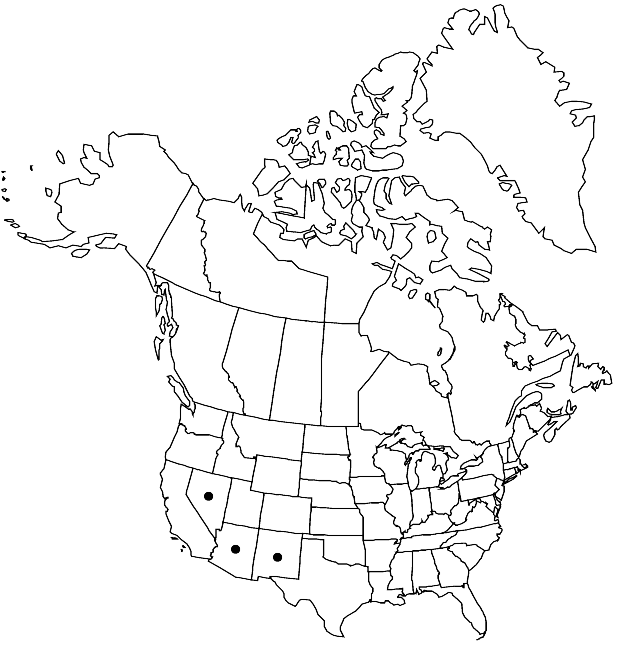Difference between revisions of "Descurainia obtusa"
in H. G. A. Engler, Pflanzenr. 86[IV,105]: 321. 1924.
FNA>Volume Importer |
imported>Volume Importer |
||
| (3 intermediate revisions by 2 users not shown) | |||
| Line 1: | Line 1: | ||
{{Treatment/ID | {{Treatment/ID | ||
|accepted_name=Descurainia obtusa | |accepted_name=Descurainia obtusa | ||
| − | |accepted_authority=(Greene) O. E. Schulz | + | |accepted_authority=(Greene) O. E. Schulz |
|publications={{Treatment/Publication | |publications={{Treatment/Publication | ||
|title=in H. G. A. Engler, Pflanzenr. | |title=in H. G. A. Engler, Pflanzenr. | ||
| Line 10: | Line 10: | ||
|name=Sophia obtusa | |name=Sophia obtusa | ||
|authority=Greene | |authority=Greene | ||
| + | |rank=species | ||
|publication_title=Leafl. Bot. Observ. Crit. | |publication_title=Leafl. Bot. Observ. Crit. | ||
|publication_place=1: 96. 1904 | |publication_place=1: 96. 1904 | ||
| Line 16: | Line 17: | ||
|name=Sisymbrium obtusum | |name=Sisymbrium obtusum | ||
|authority=(Greene) A. Nelson & J. F. Macbride | |authority=(Greene) A. Nelson & J. F. Macbride | ||
| + | |rank=species | ||
}} | }} | ||
|hierarchy=Brassicaceae;Brassicaceae tribe Descurainieae;Descurainia;Descurainia obtusa | |hierarchy=Brassicaceae;Brassicaceae tribe Descurainieae;Descurainia;Descurainia obtusa | ||
| Line 40: | Line 42: | ||
-->{{#Taxon: | -->{{#Taxon: | ||
name=Descurainia obtusa | name=Descurainia obtusa | ||
| − | + | |authority=(Greene) O. E. Schulz | |
| − | |authority=(Greene) O. E. Schulz | ||
|rank=species | |rank=species | ||
|parent rank=genus | |parent rank=genus | ||
| Line 55: | Line 56: | ||
|publication year=1924 | |publication year=1924 | ||
|special status= | |special status= | ||
| − | |source xml=https:// | + | |source xml=https://bitbucket.org/aafc-mbb/fna-data-curation/src/2e0870ddd59836b60bcf96646a41e87ea5a5943a/coarse_grained_fna_xml/V7/V7_828.xml |
|tribe=Brassicaceae tribe Descurainieae | |tribe=Brassicaceae tribe Descurainieae | ||
|genus=Descurainia | |genus=Descurainia | ||
Latest revision as of 22:36, 5 November 2020
Biennials; glandular or eglandular; finely pubescent, often canescent, trichomes dendritic, sometimes mixed with simple ones. Stems erect, unbranched basally or branched proximally and/or distally, 4–12(–15) dm. Basal leaves: petiole 0.5–3.7 cm; blade pinnate, oblanceolate to obovate or ovate in outline, 1–6 cm, lateral lobes (2–5 pairs), oblanceolate to linear or narrowly lanceolate, (7–25 × 2–10 mm), margins usually entire or serrate, rarely incised, (apex obtuse). Cauline leaves sessile or shortly petiolate; blade smaller distally, distal lobes often narrower, surfaces densely pubescent. Racemes considerably elongated in fruit. Fruiting pedicels ascending to divaricate, straight, 6–15 mm. Flowers: sepals spreading or sometimes ascending, greenish to yellowish, oblong, 1–2 mm, densely pubescent, (trichomes dendritic, sometimes mixed with glandular papillae); petals oblanceolate, 1–2 × 0.5–0.7 mm (equaling or shorter than sepals); median filaments 1.4–2 mm; anthers 0.2–0.3 mm. Fruits divaricate to suberect, linear, slightly torulose, 10–20(–23) × 0.7–1 mm, (acute at both ends); valves each with distinct midvein, (sparsely to densely pubescent); septum not veined; ovules 16–40 per ovary; style 0.1–0.2 mm, glabrous. Seeds uniseriate or biseriate, light brown, oblong, 0.7–1.1 × 0.5–0.6 mm. 2n = 14.
Phenology: Flowering May–Sep(-Oct).
Habitat: Gravelly grounds, sandy areas, disturbed sites, open forests, plateaus, abandoned mine areas, dry streams and washes
Elevation: 1500-2600 m
Distribution

Ariz., Nev., N.Mex., Mexico (Baja California).
Discussion
As circumscribed here, Descurainia obtusa is a relatively uniform, diploid species. It probably was involved as a parent of D. adenophora, which is a hexaploid readily distinguished by characters discussed thereunder.
Selected References
None.